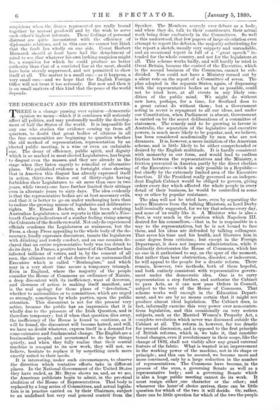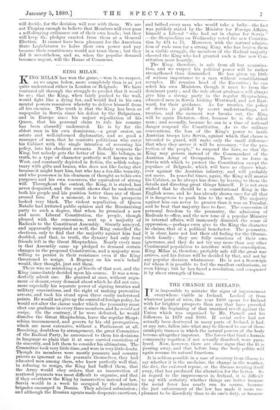THE DEMOCRACY AND ITS REPRESENTATIVES. T HERE is a change passing
over opinion—democratic opinion we mean—which if it continues will seriously affect all politics, and may profoundly modify the develop- ment of half the States of the world. It is impossible for any one who studies the evidence coming up from all quarters, to doubt that great bodies of citizens in all the free communities are beginning to question whether 'the old method of representation, representation by an i!elected public meeting, is a wise or even an endurable one. The decay of efficiency, public spirit, and dignity which is so marked in most elected Legislatures, has begun / to disgust even the masses, and they are already in the stage when they listen eagerly to remedial or alternative plans. We published evidence a fortnight since showing that in America this disgust has already expressed itself in action, thirty-two States out of thirty-eight having forbidden their Legislatures to sit more than once in two years, while twenty-one have further limited their sittings even in alternate years to sixty days. The idea evidently is that the representative bodies are at best necessary evils, and that it is better to go on under unchanging laws than to endure the growing misuse of legislative and deliberative rights. Mr. Ernest Beckett, who has been studying Australian Legislatures, now reports in this month's Nine- teenth Century indications of a similar feeling rising among the Colonists of the Southern world. Not only do experienced officials condemn the Legislatures as nuisances, but the Press, a cheap Press appealing to the whole body of the de- ' mocracy, loudly expresses discontent, taunts the legislators with drinking and rowdy conduct, and on one occasion de- clared that an entire representative body was too drunk to do its duty. In France, a positive hatred of the Chamber has infected millions of voters, and is, by the consent of all men, the ultimate root of that desire for an untrammelled Executive which is called " Boulangism," and which may in a very short time secure a temporary triumph. Even in England, where the majority of the people consider the House of Commons an ordinance of Nature, a deep discontent with its inefficiency, want of decorum, and slowness of action is making itself manifest, and is the real apology for those plans of "devolution," whether to nationalities or to committees, which are urged so strongly, sometimes by whole parties, upon the public attention. This discontent is not for the present very active, because the public has an impression that it is wholly due to the pressure of the Irish Question, and is therefore temporary ; but if when that question dies away, the inefficiency of the House is found to continue, as it will be found, the discontent will become hatred, and will, we have no doubt whatever, express itself in a demand for some extensive and fundamental change. The English are a businesslike people, and accustomed to do large things quietly, and when they fully realise that their central machine is unequal to its new work, they will not, we believe, hesitate to replace it by something much more exactly suited to their needs.
It is interesting, under such circumstances, to observe the direction which tentative efforts take in different places. In the National Government of the United Strytes they have ended, as Mr. Bryce shows us, and, as wt- see, the American publicists begin to admit, in the pre ctical abolition of the House of Representatives. That body is replaced by a long series of Committees, and actual legisla- tion is in practice carried on by their Ohairmen, subject to an undefined but very real general control- from tilt Speaker. The Members scarcely ever debate as a body, and when they do, talk to their constituents, their actual work being done exclusively in the Committees. So well is this understood, that few papers of large circulation even attempt to report the debates, the majority substituting for the report a sketch, usually very snippety and unreadable, and an occasional report in full of a "great speech" in- tended for the whole country, and not for the legislators at all. This scheme works badly, and will hardly be tried in Great Britain, because the control of the Executive, which is the second business of the Commons, cannOt be sub- divided. You could not have a Ministry turned out by a silent vote on the report of a Committee of seven. The plan adopted in the separate States, again, of dispensing with the representative bodies as far as possible, could not be tried here, at all events in any likely con- dition of the public mind. We might do without new laws, perhaps, for a time, for Scotland does to a great extent do without them ; but a Government acting in secret is repugnant to all our ideas, and under our Constitution, when Parliament is absent, Government is carried on by the secret deliberations of a committee of statesmen. The remedy said to be growing in favour in Australia, the separation of the legislative and executive powers, is much more likely to be popular, and, we believe, has been considered academically by men who are not dreamers. It is, however, a mere imitation of the American scheme, and is little likely to be either comprehended or desired by the English multitude. It is hardly consistent with monarchy in our form, and would lead to endless friction between the representatives and the Ministry, a friction prevented in America partly by the direct election of the Executive—which is only possible in a Republic— but chiefly by the extremely limited area of the Executive function. If the President really governed as an indepen- dent English Cabinet would be obliged to govern, giving orders every day which affected the whole people in every detail of their business, he would be controlled in some way or other by popular resistance.
The plan will not be tried here, even by separating the active Ministers from the talking Ministers, as Lord Derby half-ironically suggested, for we try that scheme every day, and none of us really like it. A Minister who is also a Peer, is very much in the position which Napoleon M. desired for his counsellors,—that is, he is responsible in a way to the representatives, but he is not bound to face them, and his ideas are defended by talking colleagues. That saves his time and his health, and liberates him in some degree from criticism ; but except in the Foreign Department, it does not improve administration, while it distinctly deteriorates the House of Commons, which has no one in it authorised to say, on the spur of the moment, that rather than bear obstruction, disorder, or indecorum, he will appeal to the people for a drastic reform. There remain, however, two methods, both of them hopeful, and both entirely consistent with representative govern- ment under the democratic idea. One is to carry representation a step further, and authorise the Cabinet to pass Acts, as it can now pass Orders in Council, subject to the veto of the House of Commons. That scheme works well enough in the Education Depart. ment, and we are by no means certain that it might not produce almost ideal legislation. The Cabinet does, in fact, informally exercise this very power over non-conten- tions legislation, and this occasionally on very serious subjects, such as the Married Women's Property Act, a complete revolution which never was discussed outside the Cabinet at all. The reform is, however, far too drastic for present discussion, and is opposed to the first principle of British reforms, which is, we take it, that constitu- tional changes, even if revolutionary in their scope, like the change of 1832, shall not visibly alter any grand external feature of the fabric. What is wanted is an improvement in the working power of the machine, not in its shape or principle ; and this can be secured, we become more and more convinced, only by a large reduction in the number of representatives. The Commons have become, in the process of the suns, a governing Senate as well as a representative body ; and a governing Senate which is also a huge public meeting cannot do its work. It must resign either „one character or the other; and whenever the hour/of choice arrives, there can be little question for which of the two it will decide. Or, rather, there can be little question for which of the two the people will decide, for the decision will rest with them. We are not Utopian enough to believe that Members will ever pass a self-denying ordinance out of their own heads ; but they will keep th::, pledges exacted from them at a General Election. It cannot have been pleasant for the American State Legislatures to halve their own power and pay because their constituents would not trust them ; but they did it nevertheless, and so, when the popular demand becomes urgent, will the House of Commons.















































 Previous page
Previous page